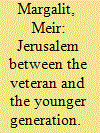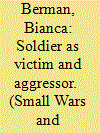|
|
|
Sort Order |
|
|
|
Items / Page
|
|
|
|
|
|
|
| Srl | Item |
| 1 |
ID:
185255


|
|
|
|
|
| Summary/Abstract |
Evidence suggests that most of the UK public appreciate currently serving UK Armed Forces personnel but are less positive in their beliefs about veterans. This research examined the social representations held by civilian participants of UK veterans and serving soldiers to understand why veterans may be seen more negatively. An open-ended word association task was completed by 234 UK participants where they were asked to provide three initial responses to the words “veteran” and “soldier” and to evaluate their responses in accordance to prototypicality. The 1,404 resultant associations were grouped into 14 thematic clusters. Using the hierarchical evocation method, the results suggest “heroizing associations” to be a defining core element for “soldier” and “veteran” but “victimizing associations” to be an element only for “veteran.” Principal component analyses suggest victimizing associations are related to war and deindividuated associations; “heroizing associations” are related to characterizations of the veteran’s personality. Implications and future directions are discussed.
|
|
|
|
|
|
|
|
|
|
|
|
|
|
|
|
| 2 |
ID:
142445


|
|
|
|
|
| Summary/Abstract |
It is time for generational change in the Israeli peace camp, with the old guard’s insights about why it failed to win public support for a peace agreement.
|
|
|
|
|
|
|
|
|
|
|
|
|
|
|
|
| 3 |
ID:
190719


|
|
|
|
|
| Summary/Abstract |
This article examines the subversion of the hero soldier figure in three Vietnam War films from three different nations that faced defeat in Vietnam: Coppola’s Apocalypse Now, Schoendoerffer’s Dien Bien Phu, and Jeong Ji-yeong’s White Badge. A close analysis reveals that all three films undermine the image of the virtuous and powerful hero soldier through recurring stylistic elements. Apocalypse Now, through the ‘Ride of the Valkyries’ helicopter sequence – as well as the opening and ending sequences – portrays the American soldier as a barbaric aggressor. Dien Bien Phu, meanwhile, visually undermines the image of the powerful hero soldier through cinematographic techniques which portray the French soldiers in the field as small and powerless. Finally, White Badge – which, unlike the two other films, takes place in the post-war period – subverts the image of the hero soldier through its use of auditory and visual elements to portray the Korean soldier as aggressor and, first and foremost, victim. The article concludes with a discussion of how the three films influence audiences’ perceptions of those who fought in Vietnam.
|
|
|
|
|
|
|
|
|
|
|
|
|
|
|
|
| 4 |
ID:
144744


|
|
|
|
|
| Summary/Abstract |
The embellishment of a warrior biography has a long history but examples of veteran elaboration of traumatic experience have become increasingly apparent. Although legislative change in the UK has removed the penalties for fabrication and a progressive decline in the military footprint may have increased the likelihood of such false trauma narratives, a paradigm shift in explanations for mental illness underpins this phenomenon. The recognition of post-traumatic stress disorder (PTSD) in 1980, followed by studies to identify risk factors, led to a greater appreciation of psychological vulnerability. As a result, the use of shame to discourage acts formerly labelled as “cowardly” or “lacking in morale fibre” is no longer considered appropriate. Recent conflicts in Iraq and Afghanistan generated popular sympathy for service personnel, whilst media focus on PTSD has led the UK public to believe that most veterans have been traumatised by their tours of duty.
|
|
|
|
|
|
|
|
|
|
|
|
|
|
|
|
| 5 |
ID:
157497


|
|
|
|
|
| Summary/Abstract |
In this article, we employ the theoretical framework and concepts of Pierre Bourdieu to examine the notion of “transition” from military to civilian life for U.K. Armed Forces personnel. We put Bourdieu’s concepts of habitus, capital, and field to work in highlighting key differences between military and civilian life. The use of social theory allows us to describe the cultural legacy of military life and how this may influence the posttransition course of veterans’ lives. There may be positive and negative transition outcomes for service personnel when moving into civilian life, and by applying Bourdieu’s theoretical concepts, we explain how such outcomes can be understood. We suggest that the “rules” are different in military environments compared to civilian ones and that service personnel must navigate a complex cultural transition when moving between environments. There are numerous and significant implications—including policy applications—from understanding transition through a Bourdieusian lens, and these are highlighted throughout.
|
|
|
|
|
|
|
|
|
|
|
|
|
|
|
|
| 6 |
ID:
190792


|
|
|
|
|
| Summary/Abstract |
As a reaction to the Veterans Affairs (VA) hospital scandal in 2014, the Veterans Choice Act of 2014 was enacted to enhance veterans’ access to health care. This study evaluated the productivity change of a panel of 102 VA hospitals from 2011 through 2019 to examine how the Act influenced the overall VA hospital productivity. The results revealed that the overall productivity of VA hospitals declined over the period and VA hospitals were not operating at an optimal scale to produce maximum outputs due to a decrease in the number of veteran patients after the Act was implemented. In addition, the technical change value less than 1 implies that VA hospitals produced fewer outputs with the given input resources over the period due to lagged adoption of innovative health care technology.
|
|
|
|
|
|
|
|
|
|
|
|
|
|
|
|
| 7 |
ID:
170784


|
|
|
|
|
| Summary/Abstract |
There are currently an estimated 2.8–3.8 million people in the UK who fulfil the UK Ministry of Defence definition of a military veteran (a minimum of one day’s military service). Despite these numbers, there is little research on who the public views as a veteran and how this differs across society. Rachael Gribble, Simon Wessely, Susan Klein, David A Alexander, Christopher Dandeker and Nicola T Fear examine public conceptualisations of the term ‘veteran’ compared with definitions from the Ministry of Defence and those of ex-service personnel themselves. Factors associated with commonly endorsed definitions are identified.
|
|
|
|
|
|
|
|
|
|
|
|
|
|
|
|
| 8 |
ID:
187103


|
|
|
|
|
| Summary/Abstract |
An aging veteran population with a median age of 65, their inferior health status, and the rapidly growing number of women veterans propel veterans affairs (VA) hospitals to provide a wide range of nursing services. However, despite the significant roles of nurses and chronic nurse shortages in VA hospitals, there has been little research on the determinants of nurse turnover in the VA healthcare system. This study analyzed registered nurse turnover rates at a panel of 118 VA hospitals from 2015 through 2017 and found that nurse turnover is significantly influenced by patient mortality, job satisfaction, annual salary level, and preventable hospitalizations. These findings suggest that VA hospitals should maintain proper nurse workloads and implement programs that can improve nurses’ stress level and job satisfaction.
|
|
|
|
|
|
|
|
|
|
|
|
|
|
|
|
|
|
|
|
|